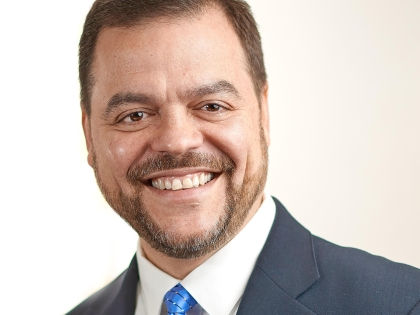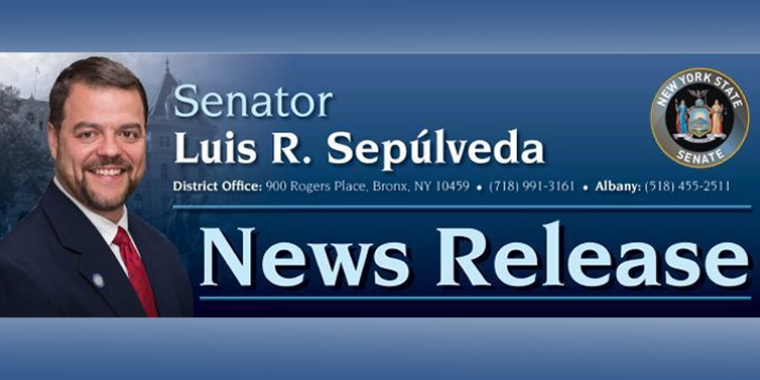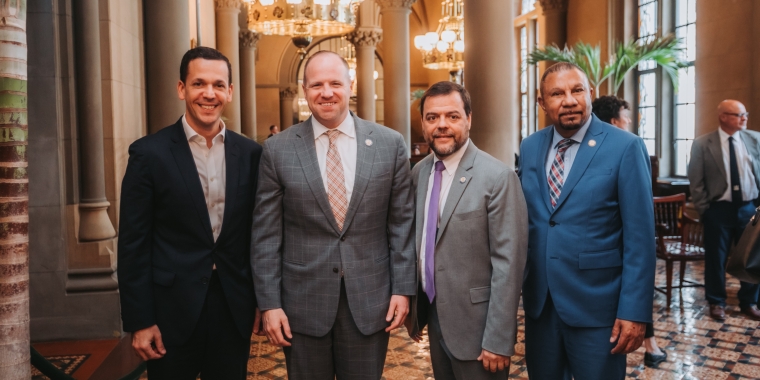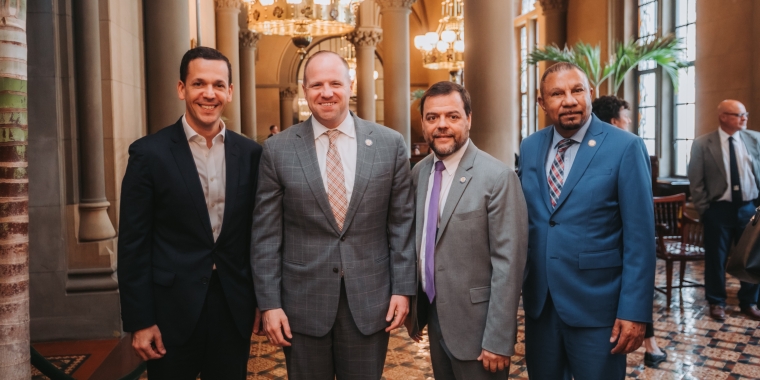
State Senate Forum to Look at Progress in State Board of Parole Reforms since Critical Report
Senator Luis Sepulveda
November 27, 2018
-
ISSUE:
- parole reform

Two years after a critical investigative newspaper report, State Senator Luis Sepulveda, Ranking Member of the Senate Committee on Crime Victims, Crime and Correction, joined by Senator Gustavo Rivera, Ranking Member of the Senate Health Committee, were to hear testimony today at a Senate Democratic Conference Forum on what progress the State Parole Board has made and what further reforms need to be made.
In prepared testimony at a Manhattan hearing, speakers from a number of advocacy groups, including formerly incarcerated people, were to focus on procedures the Parole Board follows during parole hearings, the Board’s structure, and data indicating potential racial disparity in its parole decision-making process needs to improve.
The Parole Board has recently been criticized over a number of issues, and was the subject of a 2016 in-depth investigative report in The New York Times, which stated, “Intended as a progressive tool to promote good behavior, parole has devolved into a hurried, often chaotic procedure.”
The report found that the Parole Board has not been fully staffed for years and rarely interviews incarcerated individuals in person. The reporting documented how Parole Board members hear cases just two days a week and see as many as 80 individuals in that time.
The Parole Board is currently understaffed, with the capacity for 19, but only 12-seated Commissioners. Commissioners are mainly from upstate New York and have tended to have backgrounds in law enforcement rather than rehabilitation, though that has been slowly changing.
“While the Parole Board HAS made progress since the Times report, recent data from reform advocates on parole decisions, a review of the current system is called for, with proposed legislative remedies,” said Sepulveda.
Among the positive changes at the Board, half its members are now minorities, and there are more diverse backgrounds among the board members.
Also, release rates of incarcerated people have increased.
“While there has been positive progress, I would hope today’s testimony gives impetus to the passage of some still-needed reform bills, as well as continuing internal changes by the Parole Board itself,” said Senator Sepulveda.
“The testimonies presented by advocacy groups at today’s public forum shed further light on how our State’s Parole Board policies and practices continue to affect the lives of incarcerated and formerly incarcerated individuals, even after they have been rehabilitated,” said State Senator Gustavo Rivera. “Along with Senator Sepulveda, I will continue proposing common sense measures, such as my bill to implement discretionary release as part of the parole process, to transform our State's parole system into one that imparts justice to both victims and incarcerated individuals."
Earlier this year, Gov. Cuomo signed Sepulveda’s bill requiring the parole board to publish annual demographic data including race, ethnicity, region of incarceration and other relevant data regarding the persons it considers for release.
“We now need to pass measures that also include dramatic reforms to solitary confinement, bail, speedy trial, and other criminal justice initiatives,” said Senator Sepulveda.
Prior to their testimony in the Senate Hearing Room at 250 Broadway, a number of speakers issued statements supporting the reform effort.
Jose Saldana, a community organizer with RAPP (Release Aging People in Prison), said that "While the Parole Board has recently taken steps in the right direction and begun to release more people from prison, more changes are urgently needed. The Board continues to deny parole to people in ways that maintain crises of aging, dying and despair in New York State prisons. It’s time for the leadership in New York State to step up. They must fill the Parole Board to capacity, pass elder parole, and ensure that every person in prison has a fair and meaningful opportunity for parole release based on who they are today.”
“The Osborne Association applauds Senators Sepulveda and Rivera for convening this hearing to examine current parole policy and practice. As we prepare for the 2019 legislative session, the New York State Senate has a unique opportunity to support justice, fairness, and public safety," said Osborne Association President and CEO Liz Gaynes. "We join our colleagues to call for the Senate to fill the seven vacancies on the Parole Board, and pass the Elder Parole and the Presumptive Parole bills. These bills recognize and value the humanity, remorse, and transformation of individuals who are parole eligible or serving lengthy sentences while offering safe and effective alternatives to endless punishment. We cannot punish our way to justice and public safety or continue to incarcerate people into old age and death; it is not who we are and it comes with tremendous human and financial cost.”
“It is said that true freedom requires the rule of law and justice, and a judicial system in which the rights of some are not secured by the denial of rights to others,” said the Rev. Dr. Que English, President of Bronx Clergy Criminal Justice Roundtable Inc. “We will work together to assure that those who deserve parole will receive it and not be denied based on biases. I believe what is broken can be fixed if we work together toward this end.”
“It is no secret that the New York State Parole System is in dire need of repair. Simply put, the continuous parole denial of individuals who have completed their mandatory minimum, satisfied their required rehabilitative programming, and in the interest of public safety, has been determined to be least likely to reoffend makes no sense and is definitely not a good way to spend taxpayers’ money,” said Samuel Hamilton, Reentry Advocate at Brooklyn Defender Services. “We all bear the burden and share a general responsibility for reforming an unjust and broken parole system. To that end, we at the Brooklyn Defender Services relentlessly advocate for a more balanced and transparent system.”
Groups scheduled to present testimony at the forum were RAPP (Release Aging People in Prison); Parole Preparation Project; Osborne Association; NYU Law School Center for Race, Inequality & the Law; Brooklyn Defenders Service; Campaign for Alternatives to Isolated Confinement, and the Correctional Association.
Also, Yale School of Law & Engage Strategies; Legal Aid Society; CUNY Law School; Fordham Law School; Bronx Defenders Services; JustLeadershipUSA; Eve Rosahn, former director of Legal Aid Parole Revocation Defense Unit; Crime Victims Treatment Center; Katal Center for Health, Equity, and Justice; and Corrections Accountability Project.
Share this Article or Press Release
Newsroom
Go to Newsroom

